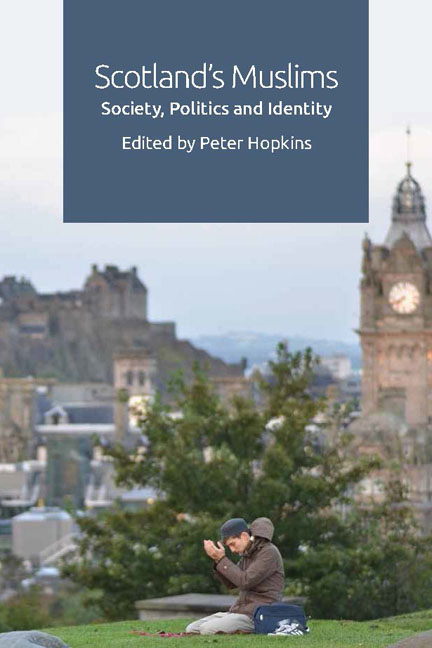Book contents
- Frontmatter
- Contents
- List of Figures and Tables
- Acknowledgements
- Notes on the Contributors
- 1 Introduction Scotland's Muslims: Early Settlement, Current Context and Research Themes
- 2 Health The Health Profile of Muslims in Scotland
- 3 Education Educational Outcomes of Muslim Pupils in Scotland and Parents' Mobilisation of Different Forms of Capital
- 4 Political Participation Young Muslims' Political Interests and Political Participation in Scotland
- 5 Gender and Migration The Role of the ‘Other’ Woman in Shaping the Subjectivities of Recent Muslim Migrant Women to Scotland
- 6 Sexuality Scottish Muslim Gay Men and the Troubling Intersection of Sexuality and Religion
- 7 Young People Muslim Youth in Scotland: Politics, Identity and Multicultural Citizenship
- 8 Generational Relations Gender and Generational Relations for Muslim Women in Scotland
- 9 Heritage Feeling Scottish and Being Muslim: Findings from the Colourful Heritage Project
- 10 Multiculturalism Multiculturalism and Scotland: ‘Bringing the Outside into the Middle’
- 11 Media Muslim Engagement with the Mainstream Media in a Scottish Context
- 12 Representation Representing Islam at the Edinburgh International Book Festival
- 13 Integration Halal Scots: Muslims' Social Integration in Scotland
- Index
6 - Sexuality Scottish Muslim Gay Men and the Troubling Intersection of Sexuality and Religion
Published online by Cambridge University Press: 23 June 2018
- Frontmatter
- Contents
- List of Figures and Tables
- Acknowledgements
- Notes on the Contributors
- 1 Introduction Scotland's Muslims: Early Settlement, Current Context and Research Themes
- 2 Health The Health Profile of Muslims in Scotland
- 3 Education Educational Outcomes of Muslim Pupils in Scotland and Parents' Mobilisation of Different Forms of Capital
- 4 Political Participation Young Muslims' Political Interests and Political Participation in Scotland
- 5 Gender and Migration The Role of the ‘Other’ Woman in Shaping the Subjectivities of Recent Muslim Migrant Women to Scotland
- 6 Sexuality Scottish Muslim Gay Men and the Troubling Intersection of Sexuality and Religion
- 7 Young People Muslim Youth in Scotland: Politics, Identity and Multicultural Citizenship
- 8 Generational Relations Gender and Generational Relations for Muslim Women in Scotland
- 9 Heritage Feeling Scottish and Being Muslim: Findings from the Colourful Heritage Project
- 10 Multiculturalism Multiculturalism and Scotland: ‘Bringing the Outside into the Middle’
- 11 Media Muslim Engagement with the Mainstream Media in a Scottish Context
- 12 Representation Representing Islam at the Edinburgh International Book Festival
- 13 Integration Halal Scots: Muslims' Social Integration in Scotland
- Index
Summary
INTRODUCTION
This chapter explores how three Scottish Muslim gay men struggle to integrate their sexual and religious identities as they navigate their sexual orientation within an existing condemnatory religious, social and cultural context. The present study illuminates the heterogeneity and diversity of experiences within the lesbian, gay, bisexual and transgender (LGBT) population. It further raises the importance of providing a nuanced portrayal of the lives of men, who do not necessarily incorporate Western discourses into making sense of their identity as gay men (Rahman, 2015).
Perusing the literature on the subject of sexuality and religion, we find that the existence of gay Muslim men in Scotland has been neither recorded nor studied. To my knowledge, no academic literature has focused specifically on Muslim men from the LGBT ‘community’ in Scotland. Their stories remain hidden and their existence ignored. I aim in this chapter to expose some of the issues that emanate from their multiple identities, to consider the intersection of the men's gay and religious identity and to explore the interplay of oppression that they experience. The chapter begins by highlighting the very limited research carried out on the lives of gay people in Scotland. This is followed by an overview of the theory of intersectionality in order to understand and situate how sexuality is not a separate entity of one's identity, but is interconnected to other parts. Adopting an intersectional framework allows us to appreciate how gay men experience different forms of oppression in relation to their race/ethnicity and sexuality in ways that are distinct from their White counterparts and/or heterosexual men (cf. Crenshaw, 1996). It is also pertinent to discuss previous research undertaken on the lives of gay Muslims to position the findings of the present study. The final part of the chapter identifies the themes emerging from the narratives of the three participants and their experiences as Scottish gay Muslim men.
THE SCOTTISH GAY SCENE
The Rainbow Europe Index 2015, which evaluates progress in European countries on LGBT equality, declared Scotland to be the ‘best country in Europe for LGBT legal equality’. Scotland met 92% of the International Lesbian, Gay, Bisexual and Trans and Intersex Association (ILGA) Europe's criteria, compared to 86% for the UK as a whole.
- Type
- Chapter
- Information
- Scotland's MuslimsSociety, Politics and Identity, pp. 117 - 135Publisher: Edinburgh University PressPrint publication year: 2017



